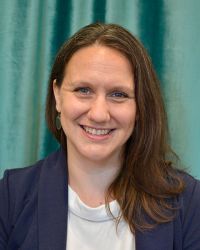Wildfires, floods, record heat, and hurricanes are just a few of the natural disasters spurred by climate change that force already vulnerable populations into deeper despair. UW Training in Urban Medicine and Public Health (TRIUMPH) alum Anne Getzin, MD, views climate change as the threat multiplier that led her to the Climate and Health Science Policy Fellowship at the University of Colorado. According to Getzin, it’s an opportunity to combine environmental justice with the health equity advocacy skills she developed through the TRIUMPH program that have been foundational throughout her career.

Anne Getzin, MD
She was first exposed to climate change and health through an 18-week course offered by the Yale School of Public Health and knew she needed to learn more.
“I have always been personally interested in sustainability and protecting our environment, but I didn’t always grasp the role I could have in my career as a physician,” says Getzin. “My time in that course was eye opening, and my work in climate medicine has taken off from there.”
Inspired, Getzin led an accredited, interdisciplinary educational series for clinicians at Advocate Health-Midwest focused on the inequitable health impacts of climate change. Along with colleagues from Healthy Climate Wisconsin, she partnered with Groundwork Milwaukee and The New School’s Urban Systems Lab to develop an assessment tool leveraging data to explore the interface between flood risk, social vulnerability, and health vulnerability in Milwaukee.
“Apart from leadership work, understanding how our changing environment is affecting our health now is critical,” adds Getzin.
During her fellowship, the first of its kind in the US, Getzin is working with Health Care Without Harm and the National Oceanic and Atmospheric Administration (NOAA). Her focus includes the intersection between environmental justice and health equity, community resilience, and the health co-benefits of climate change mitigation strategies. Knowledge she’ll bring back to Wisconsin to help address a range of climate and health issues in the state.
In Getzin’s Milwaukee community, many are impacted by the effects of urban heat islands, a condition that occurs when cities replace natural land cover with dense concentrations of pavement, buildings, and other surfaces that absorb and retain heat.
“2023 was the hottest summer on record on our planet,” shares Getzin. “We need to understand how our patients are affected by extreme heat events. Not only are many of our community members more adversely affected by heat due to where they live, they also can have conditions and medications that make them particularly vulnerable as well. We need to proactively counsel our patients on their increased risk and actions they can take to protect themselves.”
Learn more about climate change and public health:
Medical Journals Say Climate, Not COVID-19, Is Top Public Health Threat : NPR
Published: December 2023
